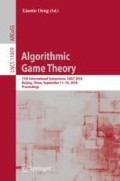Abstract
We study a generalization of hide and seek game of von Neumann [14], where each player has one or more resources. We characterize the value and Nash equilibria of such games in terms of their unidimensional marginal distributions. We propose a \(\mathcal {O}(n \log (n))\) time algorithm for computing unidimensional marginal distributions of equilibrium strategies and a quadratic time algorithm for computing mixed strategies given the margins. The characterization allows us to establish a number of interesting qualitative features of equilibria.
This work was supported by Polish National Science Centre through grant nr 2014/13/B/ST6/01807.
Access this chapter
Tax calculation will be finalised at checkout
Purchases are for personal use only
Notes
- 1.
Throughout the paper, given a positive integer m we will follow the usual practice of using [m] to denote the set \(\{1,\ldots ,m\}\).
- 2.
The system of equations can be easily used to obtain full characterization in the cases with multiple equilibria. We decided to leave it out of the paper due to presentation considerations.
References
Ahmadinejad, A., Dehghani, S., Hajiaghayi, M., Lucier, B., Mahini, H., Seddighin, S.: From duels to battlefields: computing equilibria of Blotto and other games. In: Schuurmans, D., Wellman, M.P. (eds.) Proceedings of the Thirtieth AAAI Conference on Artificial Intelligence, Phoenix, Arizona, USA, 12–17 February 2016, pp. 376–382. AAAI Press (2016)
Behnezhad, S., et al.: From battlefields to elections: winning strategies of Blotto and auditing games. In: Proceedings of the Twenty-Ninth Annual ACM-SIAM Symposium on Discrete Algorithms, SODA 2018, New Orleans, LA, USA, 7–10 January 2018, pp. 2291–2310 (2018)
Behnezhad, S., Dehghani, S., Derakhshan, M., Hajiaghayi, M.T., Seddighin, S.: Faster and simpler algorithm for optimal strategies of Blotto game. In: Proceedings of the Thirty-First AAAI Conference on Artificial Intelligence, San Francisco, California, USA, 4–9 February 2017, pp. 369–375 (2017)
Birkhoff, D.: Tres observaciones sobre el algebra lineal. Universidad Nacional de Tucuman Revista Serie A 5, 147–151 (1946)
Borel, É.: La Théorie du Jeu et les Équations Intégrales à Noyau Symétrique. Comptes Rendus de l’Académie des Sciences 173, 1304–1308 (1921). Translated by Savage L.J.: The theory of play and integral equations with skew symmetric kernels. Econometrica 21, 97–100 (1953)
Crawford, V., Iriberri, N.: Fatal attraction: salience, naïveté, and sophistication in experimental “hide-and-seek” games. Am. Econ. Rev. 97(5), 1731–1750 (2007)
Dulmage, L., Halperin, I.: On a theorem of Frobenius-König and J. von Neumann’s game of hide and seek. Proc. Trans. R. Soc. Can. 49(3), 23–29 (1955)
Fisher, D.: Two person zero-sum games and fractional graph parameters. Congr. Numerantium 85, 9–14 (1991)
Grötschel, M., Lovász, L., Schrijver, A.: The ellipsoid method and its consequences in combinatorial optimization. Combinatorica 1(2), 169–197 (1981)
Kiekintveld, C., Jain, M., Tsai, J., Pita, J., Ordóñez, F., Tambe, M.: Computing optimal randomized resource allocations for massive security games. In: Proceedings of The 8th International Conference on Autonomous Agents and Multiagent Systems-Volume 1, AAMAS 2009, IFAAMAS, Richland, SC, pp. 689–696 (2009)
Korzhyk, D., Conitzer, V., Parr, R.: Complexity of computing optimal Stackelberg strategies in security resource allocation games. In: Proceedings of the 24th AAAI Conference on Artificial Intelligence, AAAI 2010. AAAI Press, Menlo Park (2010)
Korzhyk, D., Conitzer, V., Parr, R.: Security games with multiple attacker resources. In: Proceedings of the 22nd International Joint Conference on Artificial Intelligence, IJCAI 2011, pp. 273–279. AAAI Press, Menlo Park (2011)
Korzhyk, D., Yin, Z., Kiekintveld, C., Conitzer, V., Tambe, M.: Stackelberg vs. Nash in security games: an extended investigation of interchangeability, equivalence, and uniqueness. J. Artif. Intell. Res. 41, 297–327 (2011)
von Neumann, J.: A certain zero-sum two-person game equivalent to the optimal assignment problem. In: Contributions to the Theory of Games (AM-28), vol. II, pp. 5–12. Princeton University Press (1953)
Scheinerman, E., Ullman, D.: Fractional Graph Theory. Wiley, New York (1997)
Author information
Authors and Affiliations
Corresponding author
Editor information
Editors and Affiliations
Rights and permissions
Copyright information
© 2018 Springer Nature Switzerland AG
About this paper
Cite this paper
Dziubiński, M., Roy, J. (2018). Hide and Seek Game with Multiple Resources. In: Deng, X. (eds) Algorithmic Game Theory. SAGT 2018. Lecture Notes in Computer Science(), vol 11059. Springer, Cham. https://doi.org/10.1007/978-3-319-99660-8_8
Download citation
DOI: https://doi.org/10.1007/978-3-319-99660-8_8
Published:
Publisher Name: Springer, Cham
Print ISBN: 978-3-319-99659-2
Online ISBN: 978-3-319-99660-8
eBook Packages: Computer ScienceComputer Science (R0)

